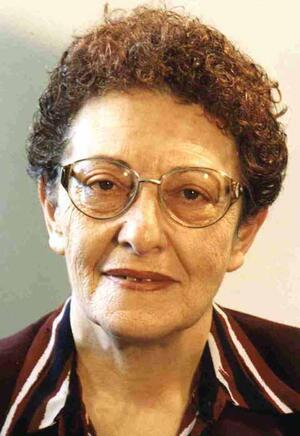Birth of Yiddish historian Chava Turniansky
Chava Turniansky made the history of Yiddish and literature among Ashkenazi Jewish communities in the Diaspora her lifelong passion. But she was almost dissuaded from making it a focus of study at all.
Turniansky herself was born and raised in Mexico in a household that spoke only Yiddish. “My parents refused to answer me if I spoke in Spanish,” she said. “For many Jewish families who immigrated from Eastern Europe to Mexico, speaking Yiddish was their way of maintaining European Jewish culture and identity.”
When Turniansky came to Israel in 1957, she found herself in the middle of a battle against the Yiddish language and any other language that wasn’t Hebrew. It was only in 1962 that Hebrew University finally opened its Department of Yiddish, following earlier, unsuccessful attempts to do so. “Yiddish was considered the language of galut [Diaspora], and Hebrew was the pure form of verbal expression – there were posters throughout the university saying it was shameful to open such a department and that Yiddish was only jargon.”
The state discouraged immigrants from speaking their native languages and insisted on Hebrew as a national language, according to Turniansky. In addition, in Israel’s early years, it was illegal to perform theatrical plays in Yiddish in Israel, with Israeli actors and actresses forbidden to perform in languages other than Hebrew.
Turniansky began studies in Yiddish at Hebrew University, where she eventually received her doctorate, and now has been affiliated with the university for over 50 years. In 2013, she was awarded the Israel Prize for her work in the field. The Prize is Israel’s most prestigious award, given to those who display excellence in their field or contribute strongly to Israeli culture.
There are many other Jewish languages in addition to Yiddish that are still spoken, said the professor. She cited Mughrabi, the language spoken by Jews from North Africa, Ladino by Jews of Spanish descent, and different dialects of Jewish Arabic from Syria to Yemen, as well as Judeo Iranian.
“But one of the greatest miracles of the Zionist movement is the living Hebrew language,” emphasized Turniansky. “It didn’t mean, however, that we needed to forget our past. Today Yiddish has the respect that it always deserved. It is a language rich in humor, depth and expression.”
In Professor Turniansky’s opinion, “The word mensch is a good indicator of what kind of language Yiddish is. A mensch is not just a word for man, it means a good man who contributes to society and loves his people. A mensch is someone that you are proud to be in his presence. As Jews that is what we must aspire to be no matter what period in history we are living in.”
Source: “Interview with Prof. Chava Turniansky, 2013 Israel Prize Winner,” The Algemeiner, April 15, 2013.




I believe it's very important to remember the languages faith and customs of our parents and their parents.
As Americans English must be our first language so that we can all communicate clearly together as one people under our God who loves us all so much.
History is fading away without children today knowing what the Holocaust is what the cost immigrants paid to have real freedom in America and the sacrifices made by generations of brave men and women of faith.
It is beautiful women such as this passing down the language of Yiddish that gives the opportunity for the next generation to appreciate the parents their parents had who made their lives possible shalom ❤️